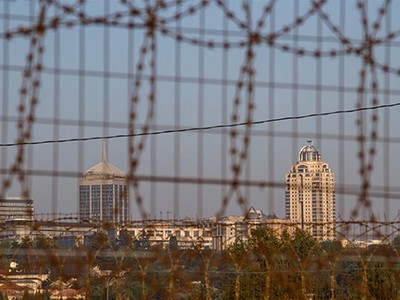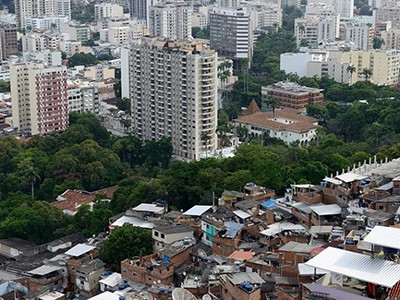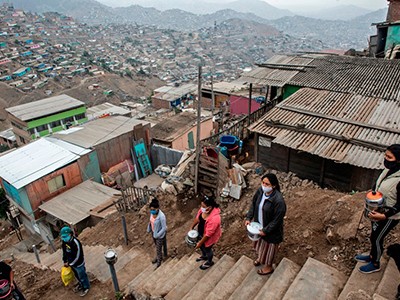
[ad_1]
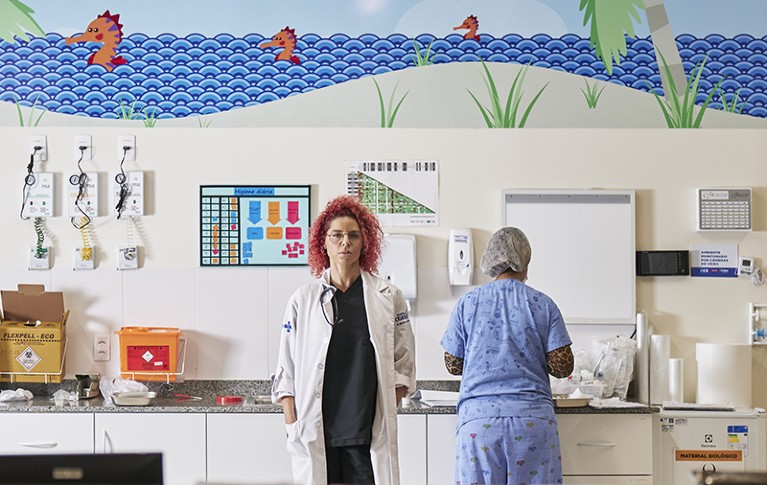
Aline Saliba loves understanding the science behind paediatric medication.Credit: Pablo Albarenga for Nature
One of the Sustainable Development Goals set by the United Nations is to make sure wholesome lives and promote well-being for all individuals, partially by decreasing world maternal mortality and ending preventable deaths of new child infants and youngsters beneath 5 years previous. Advances in paediatric care over the previous a number of many years have led to marked declines in youngster mortality. Between 1990 and 2019, world under-five mortality decreased by 59%1, however thousands and thousands of youngsters nonetheless turn out to be sick and die annually, typically from preventable and treatable causes (see ‘Meeting the target’). These deaths happen disproportionately in sub-Saharan Africa and south Asia, which collectively accounted for greater than 80% of the 5.2 million deaths of youngsters beneath 5 years previous in 2019, regardless of the areas comprising solely 51% of the worldwide inhabitants for this age group1.
Paediatricians have an important position not solely in caring for sick youngsters and their households, but additionally in monitoring a toddler’s growth from beginning to maturity. They typically conduct analysis to uncover the mechanisms that drive illness, develop therapeutics and sort out societal and environmental challenges that stop youngsters from reaching optimum well being. Nature spoke to 5 paediatricians about what impressed them to pursue the speciality, their analysis programmes and the way they’re serving to to enhance youngster well being all over the world.
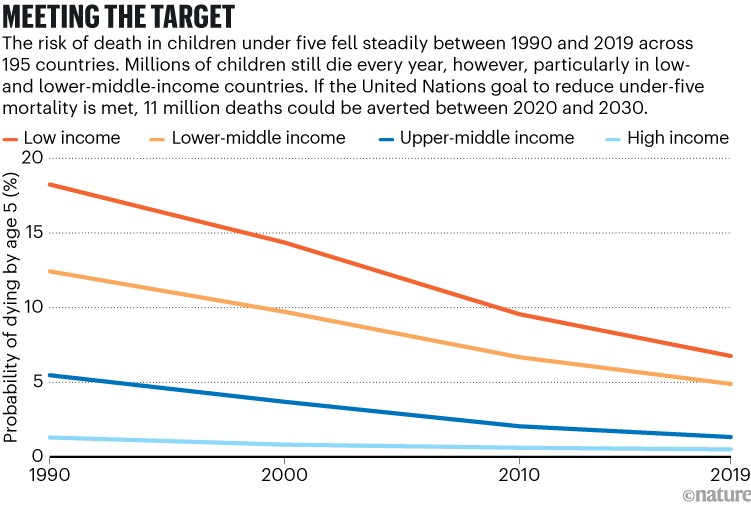
Source: Ref. 1
ALINE SALIBA: Providing care beneath strain
Critical-care paediatrician on the Children’s Hospital of Brasília José Alencar in Brasília, Brazil.
After my six-year medical-school programme on the Catholic University of Brasília, I did two residencies at native hospitals in paediatrics and paediatric intensive care, and fell in love with how resilient and powerful youngsters are. Paediatric intensive care has a extremely low dying price in Brazil, round 5%2. When I’m going to work, I do know that I’m going to resolve 95% of the instances that day. For occasion, generally I see youngsters with extreme illness, and in a few days, they’re smiling. I get a bit emotional about it; it’s magical to see these transformations.
I often work shifts of 12–24 hours. Some days, every little thing is beneath management, however most days I see disturbing occasions. I’m skilled to acknowledge extreme illness, comparable to respiratory misery or coronary heart failure. But what makes dad and mom most nervous is fever.
The best medicine for improving global health? Reduce inequality
I actually like how dynamic my job is. Every day is a shock. I get to the hospital and I do not know what the day goes to be like. Paediatrics is among the most advanced specialities in medication as a result of it encompasses a variety of completely different populations. It consists of very untimely infants, newborns, toddlers, youngsters and youngsters. I see so many various individuals with completely different pathologies, ailments and physiologies.
One of probably the most difficult facets of my job is coping with the households of very sick youngsters. Even if I do know that issues are most likely going to be okay, I’m coping with people who find themselves actually fragile and scared. Parents aren’t used to being within the intensive care unit, which is a horrible place to be if you’re not sick. It’s chilly, shiny and noisy, and everyone seems to be working so shortly. Sometimes it’s exhausting for me to precise to oldsters that I additionally really feel scared and insecure. I don’t at all times have time to embrace and luxury youngsters and their households.
When I completed my residencies in 2015, I believed now I can relaxation. But in 2016, I made a decision to pursue a grasp’s diploma in congenital coronary heart illness on the University of Brasília. I completed my grasp’s in 2019 and started my PhD in 2020, finding out how genetics influences congenital coronary heart illness and the way youngsters reply to the surgical procedures for treating it. I’ve at all times cherished understanding the science behind the drugs. Doing so permits me to view my work within the intensive care unit another way. It helps me to know why a coronary heart is failing and why a medication isn’t working.
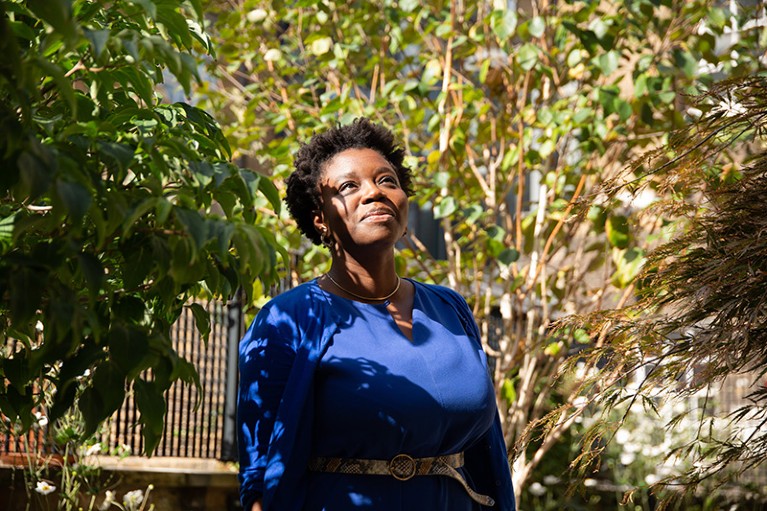
Ameenat Lola Solebo feels that youngster well being is usually an afterthought for public well being.Credit: Hanna-Katrina Jędrosz for Nature
AMEENAT LOLA SOLEBO: Putting youngsters first
Paediatric ophthalmologist at Great Ormond Street Hospital for Children, London, and a analysis clinician scientist at University College London Great Ormond Street Institute of Child Health.
I help the care of youngsters with glaucoma, cataracts and power inflammatory eye issues that put them prone to blindness. I spend most of my time engaged on a dysfunction referred to as uveitis. Uveitis is a power inflammatory dysfunction of the attention that probably causes blindness. It impacts round one in each 1,000 youngsters3. Some of the best therapies, comparable to steroids, include a bucketload of negative effects, so I’ve to be even handed when prescribing them to cease youngsters from shedding their imaginative and prescient. We positively want a greater understanding of the mechanisms of eye illness and how you can goal therapies.
During my coaching at Great Ormond Street Hospital in London, it was phenomenal to look at youngsters develop and develop, and to be the clinician for a part of their journey. I additionally love how households work together with clinicians. They’re invested in that relationship, after which, because the youngster will get older, they be part of that relationship.
I spend about 30% of my time in medical apply and the remaining doing analysis. One of the issues I’m actually happy with is doing progressive paediatric science. Normally, you research a illness in adults after which see the way it applies to youngsters. But my colleagues and I are doing imaging work to review uveitis in children first, even supposing the illness impacts youngsters and adults.
We’re additionally working a nationwide cohort research at 33 hospitals throughout the United Kingdom to attempt to perceive how we will predict who’s severely affected by uveitis and who isn’t. A great end result is when the illness is picked up earlier than it causes issues with eyesight, or when a toddler responds to therapy shortly and the illness goes into remission. A poor end result is when a toddler has restricted imaginative and prescient, both due to delays in prognosis or as a result of they didn’t reply nicely to therapy.
One of our early findings was that normal, household and primary-health-care practitioners want larger help to acknowledge indicators of uveitis early on4. It’s an unusual dysfunction in youngsters, so practitioners would possibly solely see one case each few years. My colleagues and I are creating assets to assist them to establish these uncommon ailments, together with writing an article on how you can search for modifications within the eye.
Unfortunately, youngster well being appears to be an afterthought in the case of public well being and medical apply. Children will not be mini adults. Disorders current in a different way in youngsters. So a lot of the work that’s being carried out in ophthalmology focuses on later-life grownup ailments, comparable to cataracts, glaucoma and age-related macular degeneration. Unless we have now researchers specializing in what issues seem like in childhood and the way they have an effect on a toddler’s growth, high quality of life, socialization and different outcomes that really matter to youngsters, then we’re not giving them one of the best likelihood to be one of the best adults they are often.
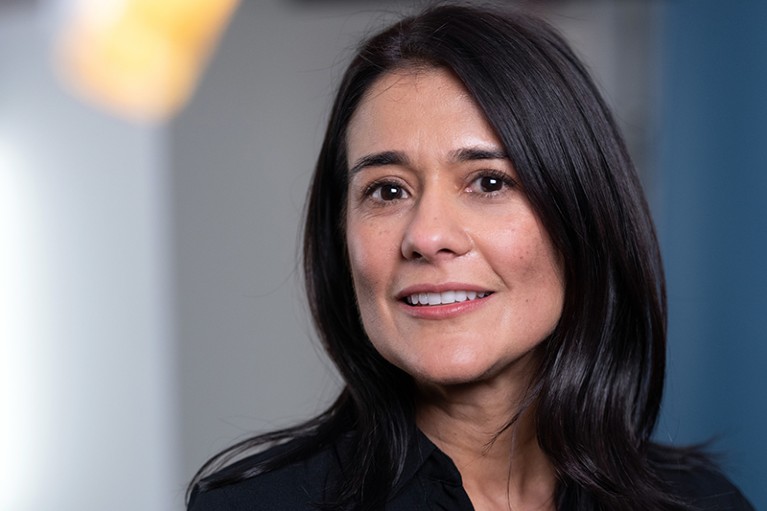
Maya Chopra says that affected person advocacy teams are key to deciding therapy priorities.Credit: Boston Children’s Hospital
MAYA CHOPRA: Digging into uncommon illness
Director of the Translational Genomic Medicine Core of the Rosamund Stone Zander Translational Neuroscience Center and a neurologist at Harvard Medical School in Boston, Massachusetts.
When I rotated by way of paediatric specialities throughout my coaching on the Children’s Hospital at Westmead in Sydney about 20 years in the past, I used to be drawn to the tough, advanced instances.
I noticed people who had uncommon issues and noticed members of the genetics crew after they gave their opinion. They would spend an hour with the affected person, evaluate the literature and are available again with a report. The first time I learn a kind of experiences, I knew that was what I needed to do.
Reducing inequality benefits everyone — so why isn’t it happening?
I used to be fascinated by the depth of literature they reviewed and evaluated within the experiences. I preferred the thought of placing items of a puzzle collectively and seeing how a sample of medical options led to a set of diagnoses. The area has moved so quick that we’re now in a position to sequence completely different parts of the genome and mix these knowledge with medical data to type an opinion.
Rare ailments have an unlimited public-health burden. For instance, one in ten households within the United States is affected by a uncommon dysfunction5, and 80% are genetic6. Sometimes a illness is so uncommon that there is likely to be solely a handful of different instances on the earth. It could be very difficult and isolating for a person and their household to seek out out that they’re the one particular person within the state or within the nation with that situation.
In my present position I work on advancing therapies from the analysis bench to the clinic for uncommon genetic issues that have an effect on neurodevelopment. The issues can result in circumstances comparable to mental incapacity, autism spectrum dysfunction and epilepsy, which collectively have an effect on 1% of the inhabitants.
I additionally run my very own analysis programme at Harvard Medical School in Boston, Massachusetts, finding out a uncommon genetic dysfunction, referred to as Chopra–Amiel–Gordon syndrome, that’s characterised by mental disabilities, speech delay and explicit facial options7. I co-discovered this dysfunction after I was working on the Imagine Institute of Genetic Diseases in Paris. In 2021, my colleagues and I authored the primary research of a world cohort of 34 individuals with the dysfunction8. This meant that it may very well be registered as a illness and people may very well be identified.
Along with interacting with households by way of my analysis programme, I spend a variety of time with affected person advocacy teams for uncommon genetic issues. These teams are main the way in which in offering a affected person voice in the case of advocating for his or her dysfunction to be thought of for therapeutic growth. They additionally inform researchers about what the priorities ought to be, as a result of after we speak about treating a dysfunction, we’d like to consider what precisely we try to deal with. Is the purpose to increase life, enhance communication or handle a behaviour comparable to sleep? As researchers, scientists and physicians, we have to hear about what’s essential to the individuals with a given dysfunction.
How COVID has deepened inequality — in six stark graphics
Throughout my profession, I’ve labored in Australia, China, France and the United States. Despite the variations in cultures and health-care settings, households all have the identical questions. They wish to know what a prognosis means for his or her youngster and what the pathway is to therapy. At our core, all people desires entry to one of the best data and know-how to have the ability to care for youngsters.
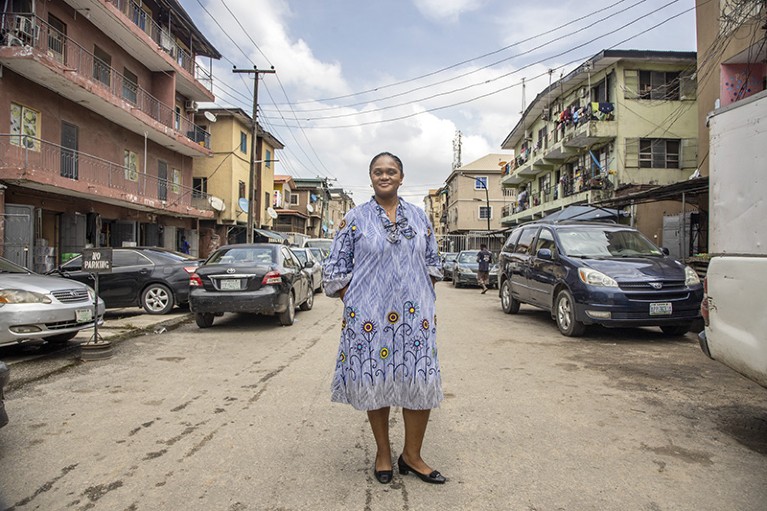
Orode Doherty began an organization to offer individuals with protected maternity providers.Credit: Andrew Esiebo/Panos Pictures for Nature
ORODE DOHERTY: Expanding entry
Founder and chief government of Ingress Health Partners in Lagos, Nigeria.
As an toddler rising up in Lagos, I used to be very sickly. I used to be at hospital on a regular basis as a result of I had febrile convulsions. I used to be impressed by the individuals I noticed on the hospital. As I acquired older, I had the unofficial position of serving to my relations to get to the well being centre, round a 30-minute stroll from our residence, after they had an damage. Those experiences motivated me to pursue medication on the University of Benin, Nigeria, in 1986, after which two paediatric residencies, in Nigeria and the United States.
Nigeria has one of many highest maternal and new child dying burdens on the earth1,9. Many ladies keep away from going to hospital or are delayed getting there, resulting in avoidable deaths. Mothers won’t have entry to protected, expert and reliable well being suppliers. My work at Ingress Health Partners, a major health-care firm I based in June 2020, consists of coaching nurses and beginning attendants to make sure that ladies obtain protected providers and that these providers are escalated as shortly as attainable when points happen.
Another problem with youngsters’s well being in Nigeria is that the nation is just not excellent with preventive care. All the essential immunizations are given, however in any other case, health-care suppliers sometimes see youngsters solely after they’re sick or if they’ve a extreme vulnerability, comparable to being born preterm. Ingress Health Partners promotes preventive care and anticipatory steering for households.
This signifies that we educate dad and mom on what to anticipate for each section of a kid’s life. For occasion, I train moms how you can breastfeed and examine new child infants’ eyes to verify they’re not yellow, which could should be handled to keep away from mind injury. I additionally advise households on what behaviours to anticipate from their infants at 6 weeks, 10 weeks and three months, as an illustration. If there are any pink flags, dad and mom know to come back again for a check-up.
In a rustic the place poverty is rife, primary health-care entry and monetary constraints can imply that youngsters don’t get the care that they want. I’m working with different health-care organizations and policymakers to increase entry to common well being protection10. We have provide you with a mannequin that we’ve seen work elsewhere, and we’re wanting ahead to piloting that.
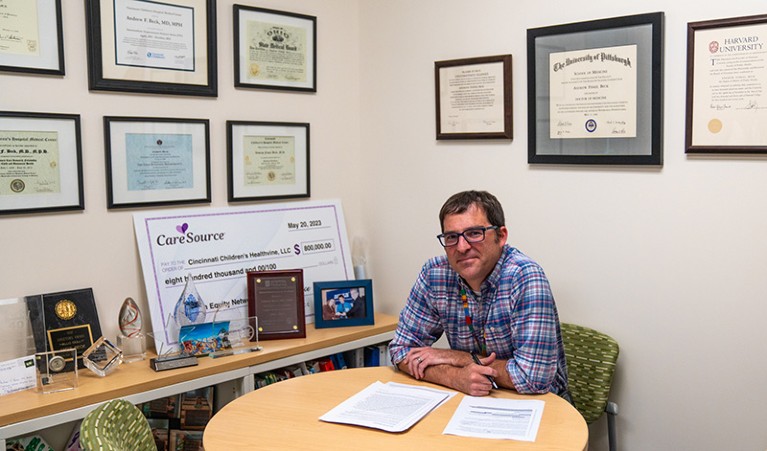
Andrew Beck’s diploma in anthropology has helped his analysis on well being inequities.Credit: Nikki Forrester for Nature
ANDREW BECK: Merging social science and medication
Paediatrician at Cincinnati Children’s Hospital and a paediatric researcher on the University of Cincinnati College of Medicine in Ohio.
My inspiration to enter paediatrics was pushed by my expertise as a counsellor at Camp Seneca Lake in upstate New York within the late Nineteen Nineties. I like working with children. Being a part of an unbelievable expertise on the summer season camp for younger individuals is just not all that completely different from my position as a paediatrician — I attempt to assist youngsters to have one of the best likelihood of being wholesome, thriving and reaching their full potential.
At medical faculty on the University of Pittsburgh in Pennsylvania, paediatric rotations have been my favorite. In the clinic, about half of the children I see now are available in for a preventive go to or a check-up to have their immunizations, developmental screens or bodily examinations to make sure that they’re rising and creating as anticipated. The different half are often there for a well being criticism, comparable to a fever, a chilly, bronchial asthma or pneumonia.
Much of my work as an attending doctor and tutorial researcher focuses on the intersection of place and well being. This is pushed largely by the disparate environments through which youngsters and their households are born, develop, reside, work and age. These components can embrace wholesome housing, meals safety, social capital and publicity to help methods, all of which could be pushed by structural racism and financial disinvestment.
One means we’ve tried to boost environments is thru the Cincinnati Child Health-Law Partnership. This is a programme that was developed about 15 years in the past to convey clinicians along with authorized advocates who’re specialists within the civil and authorized rights of low-income people and households. Every 12 months, about 1,000 households from Cincinnati youngsters’s primary-care centres are referred to this programme. The attorneys and paralegals assist them with points comparable to hostile housing circumstances, public-benefit denials or delays, and unmet instructional wants. Their advocacy has improved housing circumstances and recovered advantages that resulted in a whole bunch, if not 1000’s, of {dollars} going again into the pockets of households.
Last 12 months, we reported11 that referrals to the partnership programme had pushed down hospitalization charges by practically 38%. Currently, we’re exploring how you can prolong this partnership past primary-care centres to specialty clinics throughout the hospital.
My undergraduate diploma in anthropology is extremely related to my position as a paediatrician. In examination rooms, it helps me to contextualize the care that I present. In my tutorial life, it helps me to consider what research we will do to guage underlying inequities in well being outcomes and potential interventions we will put into place to maneuver in the direction of higher, extra equitable outcomes for youngsters in our neighborhood. Bringing a medical or public-health lens to questions round race, poverty or discrimination is basically essential as a result of we gained’t have the ability to remedy the medical challenges which are ever-present within the clinic with out enhancing the environments through which the children and their households reside.
[adinserter block=”4″]
[ad_2]
Source link
